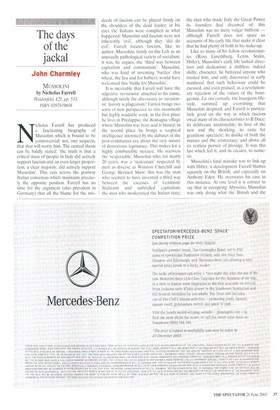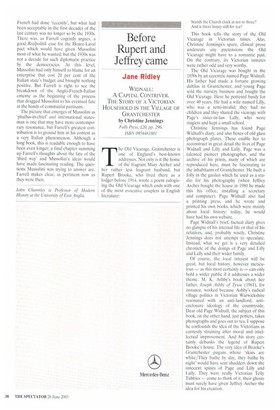The days of the jackal
John Charmley
MUSSOLINI by Nicholas Farrell Weidenfeld, £25, pp. 533, ISBN 0297819658 Nicholas Farrell has produced a fascinating biography of Mussolini which is bound to be controversial; not, one suspects, that that will worry him. The central thesis can be baldly stated: the truth is that a critical mass of people in Italy did actively support fascism and an even larger proportion, a clear majority, did actively support Mussolini'. This cuts across the postwar Italian consensus which maintains precisely the opposite position. Farrell has no time for the argument (also prevalent in Germany) that all the blame for the mis
deeds of fascism can be placed firmly on the shoulders of the dead leader; in his eyes the Italians were complicit in what happened: Mussolini and fascism were not inherently 'evil', although they 'did do evil'. Farrell locates fascism, like its author. Mussolini, firmly on the Left as an unusually pathological variety of socialism; it was, he argues, the 'third way between capitalism and communism'. Mussolini, who was fond of inventing 'battles' (for wheat, the lira and for babies), would have welcomed this 'battle for Mussolini'.
It is inevitable that Farrell will have the adjective 'revisionist attached to his name, although surely the alternative to 'revisionist' histoly is plagiarism? Farrell brings two sorts of new perspective to this mammoth but highly readable work: in the first place he lives in Predappio, the Romagna village where Mussolini was bout and is buried; in the second place he brings a sceptical intelligence informed by the debates of the post-communist era about the very nature of democratic legitimacy. This makes for a highly combustible mixture. He recovers the 'respectable' Mussolini who, for nearly 20 years, was a 'statesman' respected by men as diverse as Winston Churchill and George Bernard Shaw; this was the man who seemed to have invented a third way between the excesses of Leninism/ Stalinism and unbridled capitalism; the man who modernised the Italian state; the man who made Italy the Great Power its founders had dreamed of; this Mussolini was no mere vulgar buffoon — although Farrell does not spare us accounts of his early life that make it clear that he had plenty of both in his make-up.
Like so many of his fellow revolutionaries (Rosa Luxemburg, Lenin, Stalin, Hitler), Mussolini's early life lacked direction and dedication; a shiftless, indeed shifty, character, he betrayed anyone who trusted him, and only discovered in early manhood that such behaviour could be excused, and even praised, as a revolutionary rejection of the values of the bourgeoisie. La vita comoda, the bourgeois lifestyle, summed up everything that Mussolini despised, and Farrell is particularly good on the way in which fascism owed many of its characteristics to II Duce: its deliberate irrationality; its love of the new and the shocking; its taste for grandiose spectacle; its dislike of both the masses and the aristocracy; and above all its restless pursuit of prestige. It was this last which led it, and its creator, to nemesis.
Mussolini's fatal mistake was to link up with Hitler, a development Farrell blames squarely on the British, and especially on Anthony Eden. He overstates his case in this instance. At one level it is correct to say that in occupying Abyssinia Mussolini was only doing what the British and the
French had done 'recently', but what had been acceptable in the first decades of the last century was no longer so by the 1930s. There was, as Farrell cogently argues, a good Realpolitik case for the Hoare-Laval pact which would have given Mussolini most of what he wanted; but the 1930s was not a decade for such diplomatic practice by the democracies. At this level, Mussolini had only himself to blame for an enterprise that cost 20 per cent of the Italian state's budget and brought nothing positive. But Farrell is right to see the breakdown of the Anglo-French-Italian entente as the beginning of the process that dragged Mussolini to his eventual fate at the hands of communist partisans.
The picture that emerges of Mussolini as 'phallus-in-chief and international statesman is one that may have more contemporary resonance, but Farrell's greatest contribution is to ground him in his context as a very Italian phenomenon. Although a long book, this is readable enough to have been even longer; a final chapter summing up Farrell's thoughts about the fate of the 'third way' and Mussolini's ideas would have made fascinating reading. The questions Mussolini was trying to answer are, Farrell makes clear, as pertinent now as they were then.
John Charmley is Professor of Modem History at the University of East Anglia.



































































 Previous page
Previous page